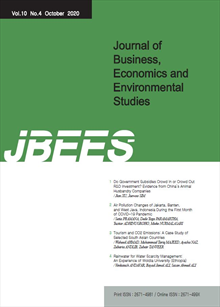간행물
The Journal of Business, Economics, and Environmental Studies KCI 등재

- 발행기관 한국유통과학회
- 자료유형 학술지
- 간기 계간
- ISSN 2671-4981 (Print)2671-499X (Online)
- 수록기간 2011 ~ 2020
- 주제분류 사회과학 > 경영학 사회과학 분류의 다른 간행물
- 십진분류KDC 325DDC 330
권호리스트/논문검색
Vol.3 No.1 (2013년 3월) 4건
1.
2013.03
서비스 종료(열람 제한)
Purpose - Micro-finance institutions (MFIs) are critical to Vietnam’s quest for poverty alleviation among the poor in the rural and agrarian communities. The current study attempts to investigate the impact of microfinance outreach programs undertaken by formal and semi-formal MFIs in Vietnam targeting the poor rural and agrarian communities. Research design, data, methodology - An enquiry was made as to whether the poor and rural communities accessed the micro credit offered by Government supported MFIs and NGOs through their microfinance outreach programs. Furthermore, the current study attempted to explore if the current mode of operations adopted by MFIs in Vietnam is sustainable. Results -The findings indicate that significant progress has been made in Vietnam to alleviate poverty among the poor rural communities through micro finance outreach programs. Conclusions - There are also pointers of MFIs sustainability in Vietnam. However, it still remains to be seen if the current sustainability pointers are long lasting without government subsidies or some international organizations financial support to microfinance outreach programs.
2.
2013.03
서비스 종료(열람 제한)
Purpose - The study investigated the obstacles to accessing finance by small business operators in the Buffalo City Metropolitan Municipality. The objectives of the study were to identify the causes of inaccessibility to finance by small business operators, to investigate the role of government agencies in supporting small business operators, to assess the extent to which banks support SMMEs and to suggest solutions to ease the challenge of inaccessibility of finance by small business operators. Research design, data, methodology – Triangulation research design was used in this study. SMME owners and managers in the Buffalo City Metropolitan Municipality were the target population. Simple random sampling technique was used to select respondents. In-depth interviews were conducted to collect qualitative data. Quantitative data was analysed using descriptive statistics, Chi-square test and factor analysis. Qualitative data was analysed using content analysis. Results - Obstacles to accessing finance were identified and discussed. Lack of collateral security, poor business plans, lack of knowledge and lack of financial deposit are some of the main factors identified. Conclusions - The banks, government and government agencies are urged to support the SMME sector for it remains the economic engine of many African countries. This sector also helps in reducing the impact of socio-economic challenges like unemployment and poverty.
3.
2013.03
서비스 종료(열람 제한)
Purpose - This study will focus on motivation of temporary workers working in distributors as well as generic companies, especially MPS (motivating potential score) proposed by job characteristics model. We think that temporary workers required intrinsic motivation in order to commit with their organization because they are difficult switch-regular workers due to glass ceiling. Research design, data, methodology – This study operates a survey targeting temporary workers, specifically, we used 144 copies except uncollected copies and dishonesty response of total 165 copies on analysis. We used multiple regression and 3 step regression to investigate the proposed model. Results - The high level of perceived distributional justice and procedural justice was increased the level of organizational commitment, respectively. And, MPS was increased the level of organizational commitment, too. Finally, this study showed that both justice and Job characteristics were very important to increase organizational commitment. Conclusions - In order to inspire temporary workers, the company provides placing enough considering job characteristics as well as fairness of the procedure and distribution. Also, to more fully understand the underlying processes between HRM (Human Resource Management) concepts, new fundamental methods may be required such as switch full-time opportunities.
4.
2013.03
서비스 종료(열람 제한)
Purpose - objective of this research is to investigate individual, organizational and environmental factors influence tacit knowledge sharing among healthcare professionals. The transmission of Tacit Knowledge is crucial for organizations to ensure that TK will be passed throughout organization, rather than stored in single employee. Research design, data, and methodology - In this study investigate organizational, individual and environmental factors that influence on TK sharing. To test hypothesizes, the survey method was chosen. Sample size was 100 but 74% of questioners returned. Results - The main findings of this research are related to influence of personal, social cultural and behavioral factors on tacit knowledge sharing. According to extracted data all factors have influence on tacit knowledge sharing except Emotional stability that was found to be negatively related to tacit knowledge sharing. That may means anxiety and stress level of workplace applies negative enhance on tacit knowledge sharing. And finally results show that social environment, team oriented culture and organizational commitment have strongest influences on tacit knowledge sharing. Conclusion - the findings of this study shows that personal, social cultural and behavioral factors influence on tacit knowledge sharing. And also indicates that, social and organizational factors enhance strongly on tacit knowledge sharing.

